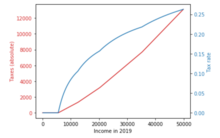Our website is made possible by displaying online advertisements to our visitors.
Please consider supporting us by disabling your ad blocker.
Taxation in Spain
This article possibly contains original research. (September 2017) |
| Part of a series on |
| Taxation |
|---|
 |
| An aspect of fiscal policy |
Taxes in Spain are levied by national (central), regional and local governments. Tax revenue in Spain stood at 36.3% of GDP in 2013.[1] A wide range of taxes are levied on different sources, the most important ones being income tax, social security contributions, corporate tax, value added tax; some of them are applied at national level and others at national and regional levels. Most national and regional taxes are collected by the Agencia Estatal de Administración Tributaria which is the bureau responsible for collecting taxes at the national level. Other minor taxes like property transfer tax (regional), real estate property tax (local), road tax (local) are collected directly by regional or local administrations. Four historical territories or foral provinces (Araba/Álava, Bizkaia, Gipuzkoa and Navarre) collect all national and regional taxes themselves and subsequently transfer the portion due to the central Government after two negotiations called Concierto (in which the first three territories, that conform the Basque Autonomous Community, agree their defense jointly) and the Convenio (in which the territory and Community of Navarre defense itself alone). The tax year in Spain follows the calendar year. The tax collection method depends on the tax; some of them are collected by self-assessment, but others (i.e. income tax) follow a system of pay-as-you-earn tax with monthly withholdings that follow a self-assessment at the end of the term.

Previous Page Next Page


